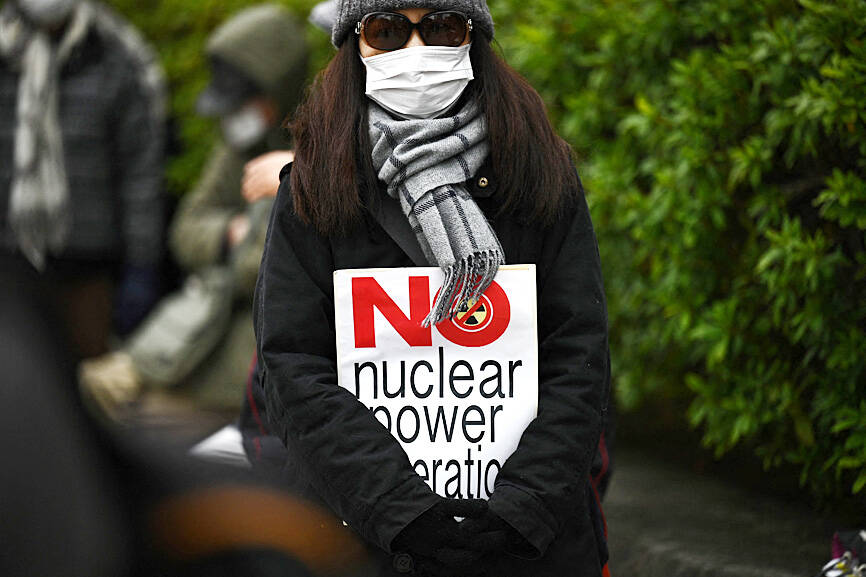Japanese Prime Minister Fumio Kishida yesterday called for a push to revive the nation’s nuclear power industry in a bid to tackle soaring imported energy costs linked to the Ukraine war.
Such a move could prove controversial after the 2011 Fukushima Dai-ichi nuclear power plant disaster led to the suspension of many nuclear reactors over safety fears.
However, like many nations, Japan — which is aiming to become carbon neutral by 2050 — has faced a squeeze on its energy supplies since Russian forces entered Ukraine six months ago.

Photo: AFP
“Russia’s invasion of Ukraine has vastly transformed the world’s energy landscape” and so “Japan needs to bear in mind potential crisis scenarios,” Kishida said at an energy policy meeting.
Japan should consider building next-generation nuclear reactors, while the government will also discuss bringing more nuclear plants online and extending the service life of reactors if safety can be guaranteed, he said.
Kishida called for “concrete conclusions by the end of the year” on the topic, which remains a sensitive one after a deadly tsunami in March 2011 caused a meltdown at the Fukushima plant, the world’s worst nuclear disaster since Chernobyl.
Eleven years on, 10 of Japan’s 33 nuclear reactors are back in action, but not all operate year-round, and the country is heavily dependent on imported fossil fuels.
The national nuclear safety watchdog has approved in principle the restart of seven more reactors, but those moves often face opposition from local communities.
“In addition to securing the operations of the 10 reactors that are already back online, the government will spearhead an effort to do all it takes to realize the restart” of the others whose safety has been approved, Kishida said.
Kishida, who joined the meeting remotely after contracting COVID-19, also urged policymakers to consider “constructing next-generation nuclear reactors equipped with new safety mechanisms.”
Before the Fukushima disaster, one-third of Japan’s power generation came from nuclear sources, but in 2020 the figure stood at less than 5 percent.
Tom O’Sullivan, a Tokyo-based energy consultant at Mathyos Advisory, said building next-generation reactors in Japan would be a “major step,” because “all the current reactors are conventional ones.”
Bringing more existing nuclear plants online will need to be approved by local governors, which could prove “politically challenging,” O’Sullivan said.
“But again, there’s a different environment now after the Ukraine war,” he said.
For the Japanese public, “I don’t think it’s just the electricity costs. It’s the reliance on Russia, for natural gas, oil and coal ... the Japanese public have really woken up to that,” he added.
Japan has imposed sanctions on Russia over the war in Ukraine along with other G7 countries.
The government has also pledged to make efforts to reduce its energy dependency on Russia, which supplies about 8 percent of Japan’s liquefied natural gas needs.

Kehinde Sanni spends his days smoothing out dents and repainting scratched bumpers in a modest autobody shop in Lagos. He has never left Nigeria, yet he speaks glowingly of Burkina Faso military leader Ibrahim Traore. “Nigeria needs someone like Ibrahim Traore of Burkina Faso. He is doing well for his country,” Sanni said. His admiration is shaped by a steady stream of viral videos, memes and social media posts — many misleading or outright false — portraying Traore as a fearless reformer who defied Western powers and reclaimed his country’s dignity. The Burkinabe strongman swept into power following a coup in September 2022

TRUMP EFFECT: The win capped one of the most dramatic turnarounds in Canadian political history after the Conservatives had led the Liberals by more than 20 points Canadian Prime Minister Mark Carney yesterday pledged to win US President Donald Trump’s trade war after winning Canada’s election and leading his Liberal Party to another term in power. Following a campaign dominated by Trump’s tariffs and annexation threats, Carney promised to chart “a new path forward” in a world “fundamentally changed” by a US that is newly hostile to free trade. “We are over the shock of the American betrayal, but we should never forget the lessons,” said Carney, who led the central banks of Canada and the UK before entering politics earlier this year. “We will win this trade war and

‘FRAGMENTING’: British politics have for a long time been dominated by the Labor Party and the Tories, but polls suggest that Reform now poses a significant challenge Hard-right upstarts Reform UK snatched a parliamentary seat from British Prime Minister Keir Starmer’s Labor Party yesterday in local elections that dealt a blow to the UK’s two establishment parties. Reform, led by anti-immigrant firebrand Nigel Farage, won the by-election in Runcorn and Helsby in northwest England by just six votes, as it picked up gains in other localities, including one mayoralty. The group’s strong showing continues momentum it built up at last year’s general election and appears to confirm a trend that the UK is entering an era of multi-party politics. “For the movement, for the party it’s a very, very big

SUPPORT: The Australian prime minister promised to back Kyiv against Russia’s invasion, saying: ‘That’s my government’s position. It was yesterday. It still is’ Left-leaning Australian Prime Minister Anthony Albanese yesterday basked in his landslide election win, promising a “disciplined, orderly” government to confront cost-of-living pain and tariff turmoil. People clapped as the 62-year-old and his fiancee, Jodie Haydon, who visited his old inner Sydney haunt, Cafe Italia, surrounded by a crowd of jostling photographers and journalists. Albanese’s Labor Party is on course to win at least 83 seats in the 150-member parliament, partial results showed. Opposition leader Peter Dutton’s conservative Liberal-National coalition had just 38 seats, and other parties 12. Another 17 seats were still in doubt. “We will be a disciplined, orderly